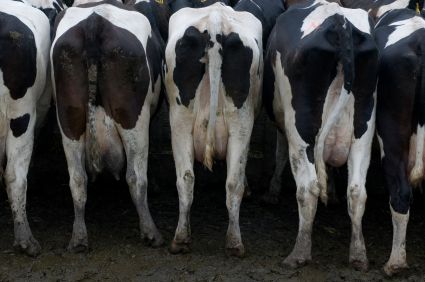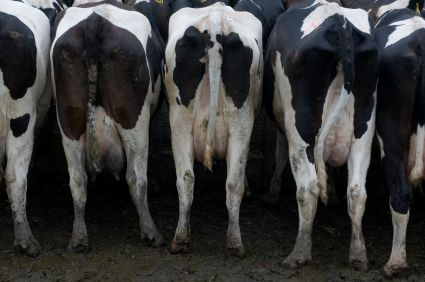 My climate for a cow fart? Dear Checkout Line,
My climate for a cow fart? Dear Checkout Line,
I read recently that meat is a huge emitter of greenhouse gas–more than even cars! It got me to wondering–does that mean all meat, or just from animals grown on factory farms? For example, I know that cow farts and burps contribute lots of methane. But don’t grass-fed cows burp and fart, too? I guess my bottom-line question is, is any beef really sustainable, in greenhouse gas terms?
Thanks,
Beef-loving Ed
Dear Beefy Ed,
Count your blessings! If we blamed global warming on human flatulence, beer and Mexican food would be verboten and scientists might make you wear this.
Is it just me, or does emitter sound like a fake noun? (I prefer what we call my two-year-old toddler when he emits gases: a toodler.) In any case, meat does generate greenhouse gases. Lots of them. The fact that burgers contribute more to global warming than SUVs was revealed in the 2005 report “Diet, Energy and Global Warming” (PDF). The paper’s co-author, Gidon Eshel, is a cattle rancher turned professor of geophysics who happens to live nearby, so I was able to buttonhole him with your questions. Oh, btw: Eshel is now a vegetarian. This fact might make a meat-lover like you nervous, but don’t jump to any conclusions yet. The answers to your questions are complex and surprising.
When I first read that a cow burp could contribute to global warming, it reminded me of the theory that the flutter of a butterfly’s wings could cause a hurricane. Of course, the cow-burp is not only more tragicomic and far less poetic–the effect is also easier to prove. Bovine gas (the burps more so than the farts) is problematic because cattle, jolly cud-chewing ruminants that they are, digest their food through enteric fermentation, which emits methane, a gas approximately 23 times better at trapping heat than carbon dioxide. According to an EPA FAQ about methane and livestock in the U.S. alone, cattle emit about 5.5 million metric tons of methane per year into the atmosphere–20 percent of U.S. methane emissions. And there 1.5 billion belching cattle here on earth, a number that is expected to grow rapidly as earth’s meat-hungry population expands.
It’s perhaps not surprising that scientists all over the world are trying to figure out how we can have our meat and eat it, too. Their attempts to make cattle emit less methane include alterations in diet, breeding, and even a vaccine.
What was surprising (at least to me) is that grazing, grass-fed cattle–those happy cows we all like to celebrate, and some of us (hi, Ed) like to eat–will, according to Eshel, emit four to five more methane than corn-fed cattle.
But wait — that doesn’t mean that you should reach for a CAFO burger.
“There are many reasons why grass-fed is superior,” says Eshel. “I don’t want anyone to think that greenhouse gas is the be-all and end-all. We have so many environmental problems.” Livestock production, especially the intensive production that is the hallmark of factory farms, contributes to all of those other problems, including energy use, deforestation, fertilizer production and runoff, and much more. Read all about it the sweeping, disturbing UN report “Livestock’s Long Shadow.”
Just because corn-fed cows emit less methane does not make them better, says Eshel, and the idea that we can convert cows into low-methane systems by feeding them corn is like asking a giraffe to graze on grass. “It’s evolutionary advantage is lost,” he says. He contends methane is a normal end-product (actually, a product of both ends) of healthy, grazing cows. Re-plumbing cows to emit less methane is, he says, absurd. “Maybe what we need to do is consider the scope of our reliance on those animals, rather than trying to re-evolve them into something that is advantageous to us,” he suggests.
He also thinks sustainable meat, in greenhouse terms, is possible, although meat production would have to be “scaled down dramatically.” Further, he says that cow manure can help reduce the life cycle fossil fuel consumption of food production. It could also reduce eutrophication of waterways caused by excess fertilizer runoff, a problem he that finds particularly troubling. One of the elements that can help end eutrophication, he says, is diverse, small-scale beef production. “If you have small herds throughout the land, not just in traditional places but throughout the country, the cows have this uncanny ability to recycle local nutrients. Pooping is one of their biggest talents. And that’s what we need of them, really.”
I called up Anna Lappé, who is currently working on a book about diet and climate, to get her take. “Historically and currently, there are some sustainable farmers who incorporate livestock, including ruminants, into a cycle that I would argue is pretty sustainable,” she told me. “Now, is that how most of the meat on the planet is being produced? No. I think that we shouldn’t delude people into saying that we don’t need to worry about meat and greenhouse gases because it can be sustainable. Most of the meat that’s out there is being produced in highly unsustainable ways.”
She also points out that most consumers don’t have access to sustainably raised meat. For these reasons, she advocates for cutting back on the stuff. For more info, check out her new web site, Take A Bite Out of Climate Change.
So, Ed, to alleviate greenhouse gas concentration, it looks as if meat lovers like us should be reaching for not only sustainable beef when we can get it, but also for veggie burgers (speaking of gas).
Your faithful food columnist,
Lou




